Serial rapists targeted women on Aurora. This woman got justice
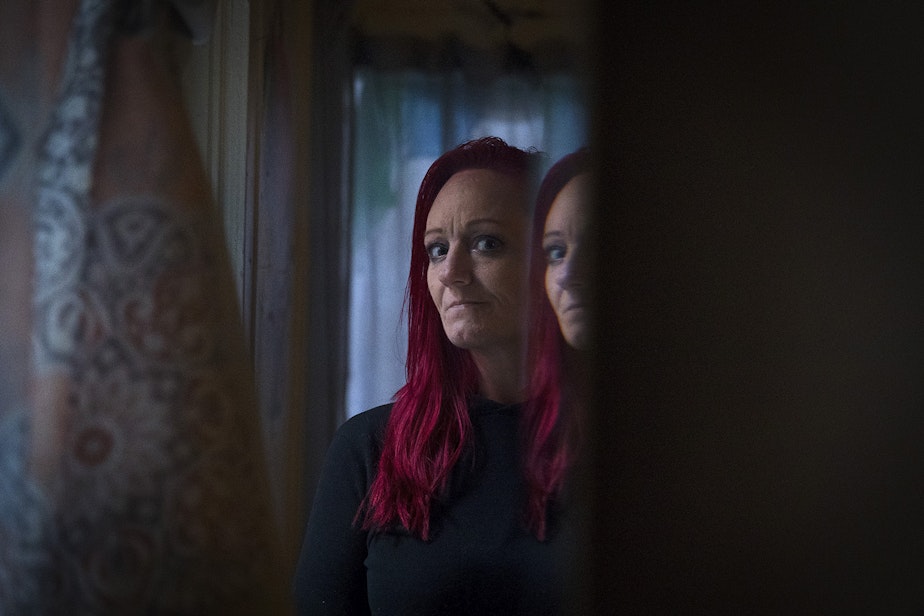
In June 2017, Robin Curtis lived in a tent one block away from busy Aurora Avenue in Seattle.
For about two and a half miles along this industrial highway, the commercial sex industry thrives. Here, along a stretch known as "the track," are faded motels, a used tire store, a Jack in the Box ... and women walking to sell sex.
Curtis, like other women experiencing homelessness and addiction on this road, started walking the track to make money, survive, and buy heroin to avoid withdrawal.
And like many of those other women, Curtis has also been raped by a man she thought was a genuine buyer.
Since 2016, at least five men have been investigated for serially targeting and raping women who sell sex on Aurora, according to law enforcement.
The women who have not been raped count themselves as lucky. But luck is in short supply on the track.
Robin Curtis’s luck ran out on a cool summer night. She was in her early 40s.
Curtis grew up in Bothell. After graduating from high school, she worked on landing gear at Boeing; later, after having two daughters, she became a tow truck driver. She loved the job because she could bring her kids; she loved being a mom and found that parenting came easily to her.
And then she was laid off. She wound up on Aurora, first as a driver for a drug dealer, then as a motel housekeeper. Walking the track was her last resort.
The night she was raped was the first night Curtis ever went to a motel room with a buyer.
Sponsored
Room 44
He went by Tap Out, my rapist.
When you do this job, the first thing you talk about is business. How much and how long? What do you want? You get paid before your services.
It has to be that way. And a lot of that has to do with our safety.
But when you get a regular, you may not ask for that money right away. Even though I’d met him only once before, we didn't talk about money. I thought well, we'll get back to the room and then we could sit and discuss it there.
We went back to the room with the understanding that I'd be paid. He was still really nice and pretty cool. He smoked crack. He was smoking a lot of it, which I thought was a little weird, but you know, to each his own.
Sponsored
Curtis said they left the motel room to buy heroin so she wouldn’t go into withdrawal. When they returned, everything changed.
The second he shut the door and was turning the lock, I was all of a sudden no longer the human that he was treating me before. I was a nasty hooker. He started calling me a cheap whore.
My first thought was, nobody knows where I’m at.
And that is one of the most heart-sinking feelings anyone can feel when you’re out here like that and you realize nobody knows where you are, and you know you're in trouble. It’s a scary feeling.
Everything I did he had a problem with. I was either too loud, or I was not happy, or I was mean sounding. Everything I did was wrong.
And I’m thinking about all the horror stories I heard about the last serial rapist and all that he had done; hand-cuffed them, blind-folded them. All this stuff starts running through my mind, is this going to happen to me?
He told me to get on my knees.
I pretty much spent the next, pretty close to 14 hours with this man who would not let me go home. Who instructed me that if I was to be loud enough that it got anybody’s attention outside the door that he would then sodomize me.
He tore me up very badly.
Sponsored
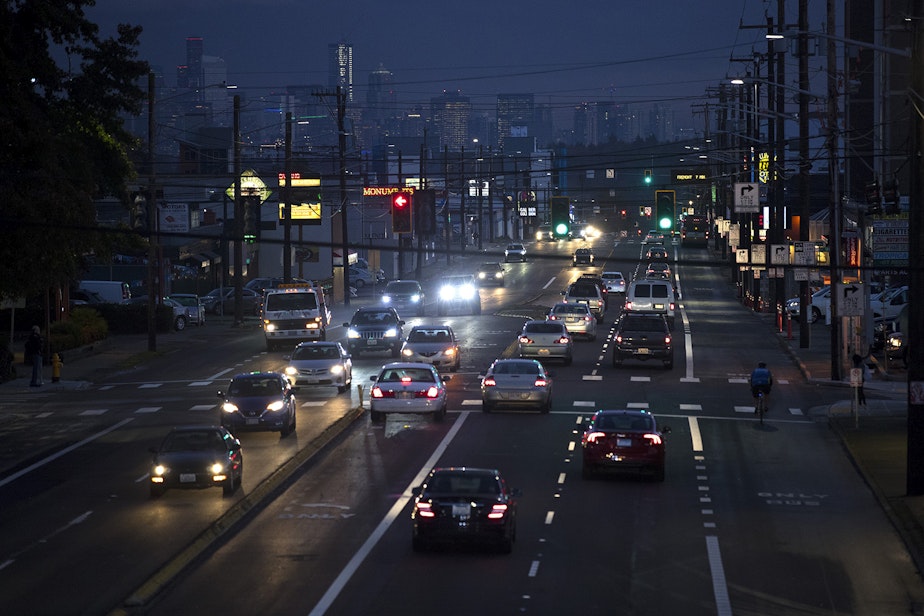
Sponsored
C
urtis didn’t know how she was going to get out of the motel room. She feared she would die there.
Her story is common. Women who work in the commercial sex trade along Aurora Avenue in Seattle face the threat of robbery and violence on a regular basis.
Law enforcement, service providers and women who walk the track agree that most of the cases – serial or not – go unreported.
“The women on Aurora are a vulnerable population so we’re targets for rapists,” said Ericka Frodsham. Frodsham used to walk the track. She became sober and left Aurora in 2016.
“When I was out there I was a target for rapists because who am I going to tell? And who is going to believe me?” Frodsham said.
Lisa Etter Carlson is a co-founder of the Aurora Commons, a drop-in spot for people who are homeless. Many of the Commons’ clients are women who sell “dates” along Aurora.
“It’s rare to have a week where we don’t have someone coming into the Aurora Commons sharing with us some kind of a sexual or physical assault,” Etter Carlson said.
The nature of their lives — the illegality of the work they do, the need to survive, the deep distrust of law enforcement — means women who work on Aurora rarely report violence. If they do, evidence can be hard to collect and witnesses hard to find.
For women who don’t report attacks to police, there’s the “bad date list.” This informal list is a tool to warn others about predators. It’s used in Seattle, and across the country, by people in the sex industry.
Police say cases that are reported tend to be particularly violent or traumatizing. They say that could be a factor in why they come forward.
Cases that have been prosecuted tell a chilling tale.
In 2016, Brandon Reed was charged with three counts of rape. He picked up women on Aurora in his silver Volkswagen Jetta, held his victims at knifepoint, and often filmed his attacks, according to court records.
A judge sentenced him to 23 years and three months in prison.
He’s suspected of raping at least three other women on Aurora, according to police.
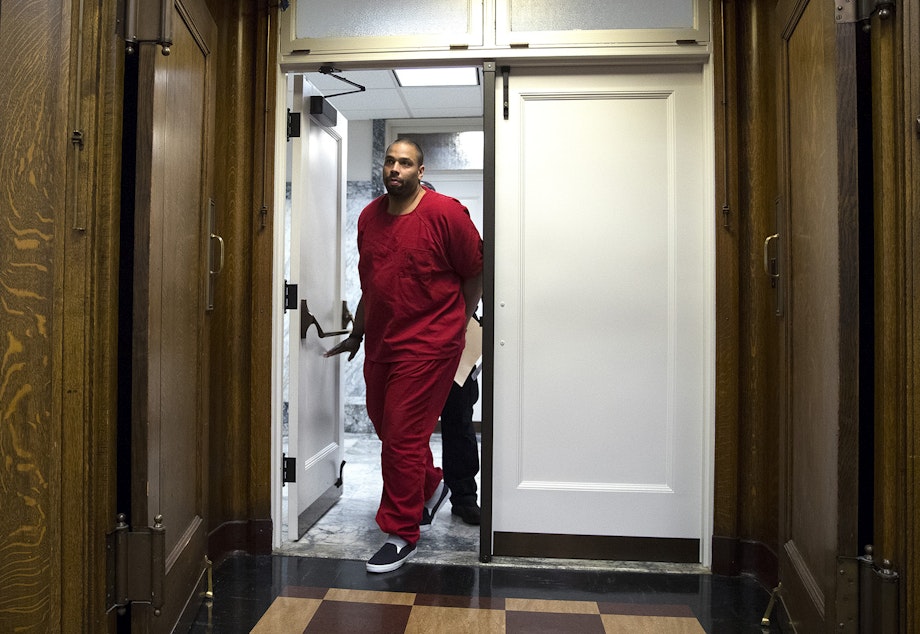
Not all men investigated for serial rape are prosecuted for multiple crimes. Some victims don’t want to be involved, some are hard to track down, and police and prosecutors may move forward with a single charge, sometimes while continuing to work on related cases.
In 2018, Marquin Robinson was charged with rape. He is believed to have raped four women along the track, according to the King County prosecutor’s office.
He was originally charged with one count, and ultimately pleaded guilty to crimes involving two women. He pleaded down to kidnapping in the first degree with sexual motivation, and assault in the second degree.
A judge sentenced him to 14 and a half years.
In the intervening time, a man named Jamie Engel (known as Tap Out) brought Robin Curtis to his motel room and raped her. Two other women elsewhere in Seattle told police that Engel raped them, too.

In October, a jury found Engel guilty of raping Robin Curtis. He will be sentenced in January. He later pled guilty to the two other rape charges. Police say he’s the suspected rapist in at least three other complaints.
A fourth man suspected of serial rape had one count of rape sent to the prosecutor’s office. He remains under investigation after prosecutors asked for more information before filing charges.
There may be a fifth serial rapist, too: This summer, police began investigating another man who may be targeting women walking the track.
“In the past five years I’ve been a sergeant assigned up here, we’ve had multiple cases of serial rapists,” said Detective Sergeant Tom Umporowicz.
Umporowicz leads one of the squads in the Seattle Police Department’s high-risk victims section of the vice unit. On Aurora, his squad deals mostly with adults in the sex industry.
He said if the same thing were to happen to a different population it would likely cause alarm among the broader community.
“When it comes to people caught up in prostitution, it just doesn’t resonate,” he said.
“Any population of people where you had those cases going on, concentrated in one area of the city, should cause anybody alarm,” he said.
Umporowicz said they do their best, but their resources are limited. He said he has a team of four detectives, two who take the lead on rape cases involving adults in the sex trade. This doesn’t include other vice work they do throughout the city.
With many cases going unreported, they may never hear about some of the experiences women like Curtis endure.
Nearly two and a half years later, Curtis still remembers her attack in vivid detail.
No. 1 Rule
He wasn't a fat man, he wasn't a big man. He was actually kind of short, kind of stocky. He was very heavy.
He grabbed my hand and he squeezed it to the point I thought he almost broke it. He told me that’s why they called him Tap Out, because he could do that with his hands.
He also told me that it takes 30 seconds to kill a man and then to realize what you have done, and then it’s already too late.
Those words will never leave me. I hear them all the time.
I was scared my kids were not going to have a mom anymore. My kids didn’t deserve this. I know that might be weird to some people, because it’s my life, and of course I wanted to live.
But that’s when you sit there and you think I’m homeless, I’m 42 years old, I’m a drug addict. People think we’re just throwaways. We all have families. We almost all have kids.
My kids were the only thing I could think of, and my man, who didn’t even know I went to work.
And then you start thinking, ‘How did I fuck up that bad that nobody knew where I was?’ Because that’s the number one rule.
There’s no training manual that tells you what to do in a rape situation.
Real life is this; I’m stuck in a motel room with this guy. He did this to me. Every part of my body hurt. My mind hurt because I could not stop thinking… how to make this man happy… how to get away… how to use something in the room as a weapon.
Having my kids on my mind, of course they would have to be my savior. I don’t know where this story came from. I don’t know why I thought of it. All of a sudden I was like, “Oh my gosh, what time is it?”
And he asked, “Why?” I said, “Because I’m supposed to meet with my daughter. And because I’m homeless, if I don’t show up, she automatically calls 9-1-1.”
He said, “It’s 12.30 p.m. and you have 30 seconds to get the fuck out of here.”
I have never moved so fast in my life. I still don’t even know if I grabbed everything.
I went straight to the Commons, praying that the door was still going to be open… I walked in right before they locked the doors and I remember my friend standing there with two cups of coffee in her hand and she said, “Oh my god, I knew you were coming back, that’s why I have two cups of coffee. We’ve been looking for you all night long” … and I just broke down.
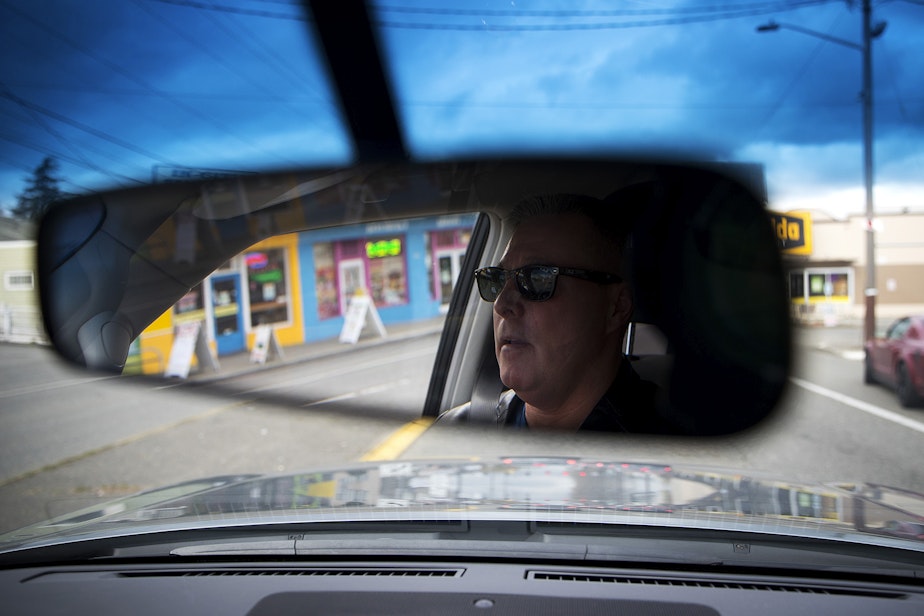
C
urtis didn’t call 9-1-1.
“The women who are willing to report it, those are very few and far between,” said Olivia Herring, a victim advocate with Seattle Police.
There’s historic distrust between people in the sex industry and law enforcement. After all, the police play a dual role: They arrest women for selling sex, but also encourage victims to report crimes against them.
“Many of the women just don’t think that they’re going to be taken seriously or that anyone is going to care,” Herring said.
And there’s also a culture on the streets: don’t talk to cops. To do so can be dangerous for people.
Many of the women along Aurora, like Curtis, are engaged in survival, street-based sex. They’re often experiencing homelessness, and often using drugs.
There are also the “circuit girls,” as the police call them, brought up from California by pimps to work the track, and some women who work seasonally. Advocates say more sex workers who used to get dates online are also walking on Aurora these days because of a crackdown on online sites.
Melodie Reece does outreach to women of color who work along the track. She said she’s seen more young women of color selling dates in recent months.
She said there are added complexities for people of color working on the track.
Reece said many don’t feel they can go to the police for help.
“Being aware of and being afraid of cops while they’re working is a very real and out front trauma for a lot of these people,” she said.
She said women will put themselves in more dangerous situations — like agreeing to drive away from the track with a date — to avoid police.
Reece said there aren’t adequate services in place to help women if they do want to leave Aurora. It would be hard for most women to walk off the track and into a different job. Advocates say it’s important for women to have viable alternatives.
And if these women report a crime, there’s nowhere to go after, said Lisa Etter Carlson of the Aurora Commons.
Thirty-three beds throughout Seattle, funded by the city, are set aside for survivors of gender-based violence, including people in the sex industry.
There are even fewer that cater to people with a substance use disorder, Etter Carlson said. The spots are often full.
Even when there’s money to place someone at a motel or hotel away from the track, service providers can’t do that unless the person has identification, and many don’t.
In addition, Etter Carlson said it’s hard to collect evidence because women rarely want to sit for hours in the hospital for a rape kit, especially when they’re staring down the barrel of oncoming withdrawal.
And then there’s the ever-present need to make enough to pay for a room, fulfill their obligation to a pimp, or avoid withdrawal means a quick return to the track is necessary.
After she escaped, Curtis said she wanted nothing more than to see her boyfriend and wash off her experience.
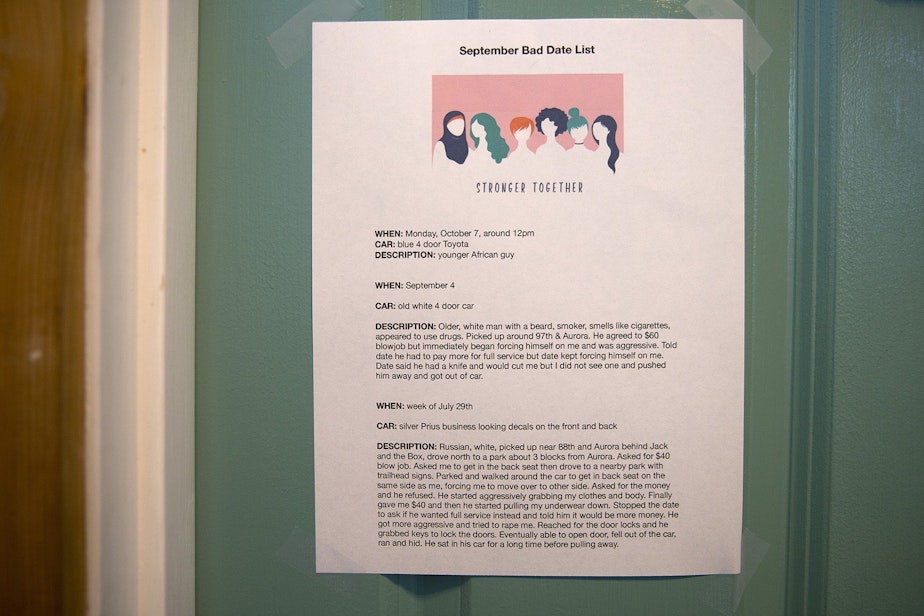
‘Robin, He’s Out Here’
I needed to shower this man off me.
My boyfriend, being the man I love, found me a friend who had a room, who was very happy to let me shower.
She had been raped several times out here. She’d been out here many, many years. She knew exactly what to do.
She was the one who told me, “I’m going to give you a couple of Ziploc bags, I want you to put your underwear in here.
“Here’s some Q-tips, I want you to swab yourself, put them in the Ziploc bags. Because if you decide to turn this man in I do not want you to regret not doing any of this.”
I did it because she told me to. And then I went and took a shower, and I washed him off me until the water was cold.
I got to the point where I didn’t want to turn him in or say anything because I just wanted it to go away. And I didn’t want to deal with the cops either.
A police investigator picked me up on the track to talk about the rape. He had heard about it.
This investigator proceeded to tell me that they had several undercovers out there driving around and walking the streets.
He told me, “We’re here to watch over you girls, we want to make sure you’re okay. There’s just too much of this going on right now.”
And he said, “I strongly, strongly advise you to turn this man in. … We’ll back you 1,000 percent. We’re on your side. We’ll do anything we can to help you.”
He was the reason why I decided to turn him in. Because he made me feel comfortable.
I
t’s not unusual for Seattle Police to receive complaints from community members who are sick of seeing women walking the track and cars trolling for dates, and tired of their kids being exposed to the sex trade.
This is one of the reasons undercover cops run stings along Aurora. But they also use the opportunity to gather information.
As women walk by, undercover police register the slow, ambling gait and the eye contact with drivers — unspoken signs that broadcast a woman’s availability for sex as clearly as a neon vacancy sign. They try to get women into their cars and back to a staging area where they’ll be arrested and offered social services, or sometimes taken to jail.
Traditionally, the criminal justice system has targeted people selling sex, with less focus on buyers and pimps. Due to a policy shift in the city over the past decade, police say it's changing. Women are still arrested, but fewer face prosecution for prostitution charges in Seattle these days. As of November 2019, eight cases have been filed this year, according to the city attorney’s office.
While women are under arrest, detectives ask them if they’ve had any bad dates recently. They try to gather information about ongoing cases, sometimes they’re trying to find women they’ve heard may be another victim of a serial rapist.
Often, regardless of whether they accept services or get locked up, the women cycle back onto the track after their interactions with police. After her attack, and even after she’d talked to detectives, Curtis remained out on Aurora. So did her attacker.
Street Family
[Tap Out] was driving around asking people where I was, explaining what I look like and what my name was.
I had so many people coming up to me, ‘Robin, Robin, he’s out here.’ This is when I got to see what street family is all about…
I had close to 30 people, sitting back on Nesbit, in a spot where you could see through to Aurora because there were no buildings in the way... who sat there with me and my boyfriend and said, “If he comes for you, he’s going to have to go through us.”
Some of these people hated each other. Some of them didn’t even really like me. But they weren’t going to let this man get to their people. And then it kind of hit me: how horrible would it be to not play any part in stopping him from getting any of my people?
C
urtis ultimately reported what happened. And the swabs she took were used as evidence in her case.
Police say reporting has increased in recent years. They credit this partly to the relationships they’ve built with service providers, and the treatment of women like Curtis who go through the process.
For those cases that don’t end up being taken to law enforcement, there’s still the bad date list.
Etter Carlson compiles the bad date list for the stretch along Aurora each month and sends it to dozens of partner organizations to be posted.
When there are multiple reports of the same person targeting women, there is an atmosphere of fear, she said.
Last year word spread about a man assaulting multiple women along Aurora. More women started walking in pairs.
The October bad date list for that year states:
“Multiple Reports made in September: Aurora Avenue around 100th and Aurora. Do not provide a date to a man named "----." He has sexually assaulted at least 7 women!”
Not every instance of rape that police hear about is sent to the prosecutor’s office. Reports may be second- or third-hand, and victims can’t be found or don’t want to cooperate. Sometimes there’s not enough evidence.
Even cases sent to the prosecutor’s office aren’t always charged. They might be sent back with a request for more information, or charged at a lower level.
Curtis’s case made it through.
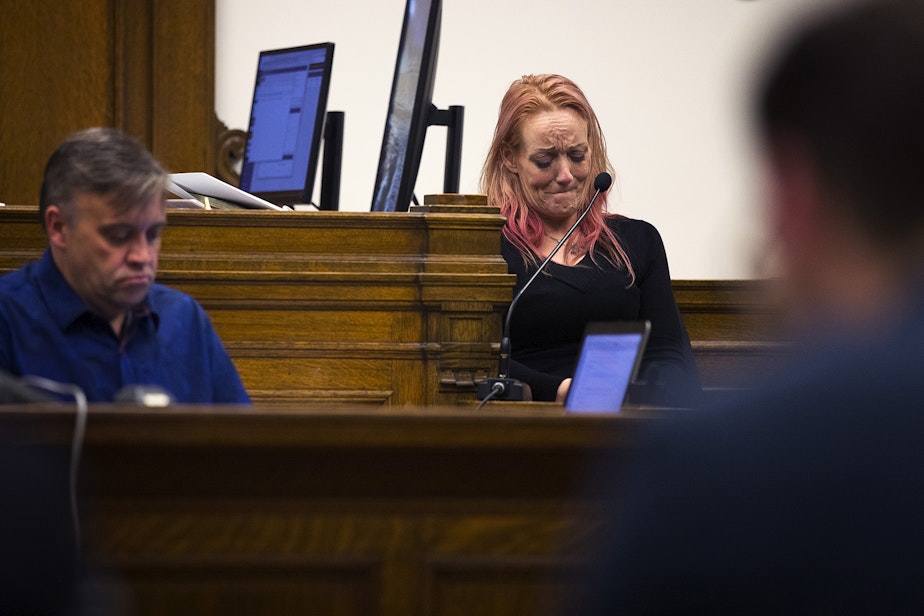
Guilty
My lawyer was the one who told me the jury found my attacker guilty. He sent me a text message and told me that they believed me.
I was happy, and excited, and a bit of that feeling of closure started to set in finally. This has been going on for so long. It was a big feeling of relief that came over me.
I can put that part of my life aside now, and kind of move on, and start healing from it.
It’s going to be with me for the rest of my life. It’s a night I’ll never forget. I’m just happy I was strong enough to go through this to get him put away.
I
t took Curtis more than two years to see justice for what she went through. Benjamin Gauen is a senior deputy prosecuting attorney at the King County Prosecutor’s office. He said the length of cases like this often poses a challenge.
“The hardest part about prosecuting these cases is keeping the victim on board throughout the process,” said Gauen.
He said the people who walk on Aurora are marginalized and vulnerable.
“A lot of them don’t have a place to live, they’re coming from an abusive situation,” he said. “They’re struggling with drug issues or mental health issues, so keeping somebody on board and cooperative is an extraordinarily difficult challenge that we have.”
Gauen said he hopes a recent change in Washington state law will encourage more people in the sex industry to report crimes. The law protects people from being prosecuted for prostitution if they’re reporting a crime.
Still, the sex industry is complicated, as are the many views that surround it. And there are no easy answers about how to prevent women on the track from facing the threat of violence and serial rapists.
This is a vulnerable population. But some are hopeful that if a point can be reached where rapists know the crimes will be reported, and if victims know they'll be believed, perhaps things will change.
Advocates argue if women and buyers continue to be arrested and prosecuted, it will drive them into riskier situations to avoid law enforcement. As it is, women on Aurora will make split-second decisions about whether to get into cars.
When asked why she believes violence persists on Aurora, Lisa Etter Carlson said she believes it’s because the women are isolated.
“They kind of walk through this neighborhood, through these streets, as if they’re ex-humans,” Etter Carlson said.
“Quite frankly, it’s because there’s not enough loving community members around them telling them that they matter, wondering how they’re doing, checking up on them.”
For her part, Robin Curtis believes more services, similar to the Aurora Commons, are needed. But she said they need to be open 24 hours so people always have a safe place to go.
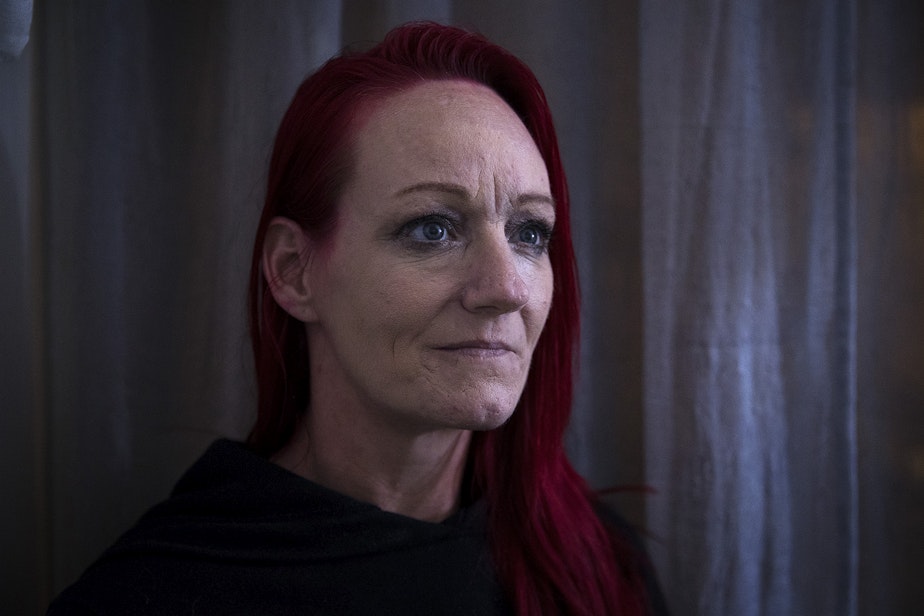
We still have feelings
People think that this is something we want to do, or it’s easy money. It’s just a way of survival out there that works for these women.
I want people to realize that just because we’ve had to do something that most people’s morals and values are against, it doesn’t mean that it changes who we are as people. We’re still moms and daughters and sisters, and we still have feelings.
There is nothing in this world that makes it okay for anybody to take advantage of another person the way this man took advantage of me.
If I can stop him from doing this to even one more person, then I’ve done something.
Portions of this story are written in the first-person, taken from two interviews with Robin Curtis. The transcript of her interviews were edited for clarity, length and structure.

